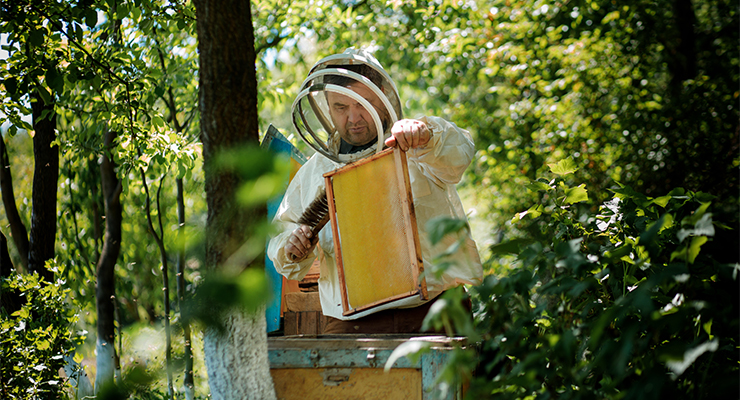
In a momentous scientific breakthrough, the US Department of Agriculture approved the world’s first vaccine for bees last week. The vaccine, pioneered by biotechnology firm Dalan Animal Health, will protect honey bees against American foulbrood disease (AFB) and heralds an era of protecting myriad species threatened by a variety of pathogens.
AFB is extremely contagious and caused by the bacterium Paenibacillus larvae. It attacks honey bee larvae in the hive, killing them before they hatch. Although it doesn’t infect live bees, an outbreak can collapse a colony in just three weeks, killing up to 60,000 bees in a stroke.
AFB spores transfer readily to uninfected hives via contaminated honey or infected combs and equipment. It’s resistant to extremes of both cold and heat, and spores can survive for more than 50 years, making containment and eradication a constant struggle.
Antibiotics and chemical treatments can be used to control it, but they offer only temporary protection and can contribute to resistant strains. If such interventions are halted, AFB outbreaks can recur. Infected bees, hives and equipment must be incinerated or irradiated to fully destroy the disease.
The new vaccine can be introduced via the feed supply to worker bees and then transmitted to the queen. After the queen ingests it, it passes on to the larvae through her reproductive system. These offspring retain their immunity, which shields them from infection. In time AFB will have no hosts to sustain it and will disappear.
AFB has ravaged bee colonies since the 19th century, and is considered the most virulent honey bee disease in the world. Experts estimate half of all commercial hives worldwide are tainted by latent AFB bacteria.
AFB can be found in all Australian states, and must be reported to authorities immediately when detected. Should the vaccine be approved for use in Australia, it would eliminate a significant risk and expense for the honey bee industry.
Beekeepers have been confronted with a plethora of challenges in recent years. Climate change has amplified habitat loss, exacerbated by droughts, floods, bushfires and storms. Population growth, forest clearing, intensive farming and pesticides, construction and pollution have compounded environmental degradation. These factors have diminished biodiversity and disrupted local ecosystems, placing bees and other species under intensive stress.
In Australia, 2.5 billion honey bees perished in NSW and Victoria during the Black Summer bushfires in 2019-20. Last year, tens of millions more were euthanised by NSW regulators seeking to thwart an invasive pest called the varroa destructor mite. If varroa mites establish a foothold in Australia, they could wipe out all domestic feral honey bees and drive more than half of commercial beekeepers out of business. There are no effective means to exterminate the mites once they spread. They were first detected in New Zealand in 2000 and infested all corners of the country in less than a decade.
Such an outcome could have a profound impact on Australia’s agricultural production. Bees’ pollination services are vital to an array of crops including apples, almonds, avocadoes, blueberries, cucumbers, mangoes and pumpkins — not to mention honey. One-third of food consumed by Australians relies on honey bees.
Faced with such challenges, the impending victory over AFB could save considerable effort and money, allowing beekeepers and authorities to focus their attention and resources on mitigating varroa mites and other hazards. It also offers hope that future innovations may emerge to combat the parasite, provided it can be held at bay in the interim.
Buoyed by its success, Dalan Animal Health intends to pursue remedies for other honey bee diseases. In a statement announcing the vaccine, Dalan CEO Dr Annette Kleiser said: “Global population growth and changing climates will increase the importance of honey bee pollination to secure our food supply. We are ready to change how we care for insects, impacting food production on a global scale.”








Glad we don’t have to inject each bee. They have a habit of injecting right back.
Yes indeed. When first reading this article I had an image of a bee rolling up a sleeve for a shot from a mask-wearing nurse. Made me smile all afternoon.
European honey bees are an imported feral invader of birds’ nesting hollows. Just saying.
In my local area, I see wild bees inhabiting nesting hollows that may otherwise be inhabited by birds and other animals. I also see birds in nesting hollows. I have seen bees displaced by birds. I think the European honey bees are in Australia to stay for good or bad. Similarly to European, Asian, African and American humans. With bees, it appears they are not significantly contributing to species destruction. On the other hand, human induced habitat destruction and climate change appear to be the most significant contributor to species destruction. I think its most urgent to solve the human induced issues. Lets do so before singling out less significant problems caused by other animal species. Just saying.
I wonder if there’s any Bee Anti-Vaxxers? 🙂
Delighted to read some good news.
There is a world renowned beekeeping family in Texas who have bred mite resistant bees:
https://beeweaver.com/our-breed/